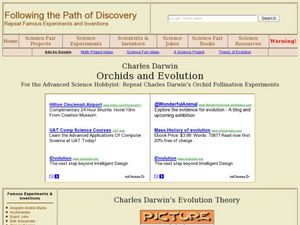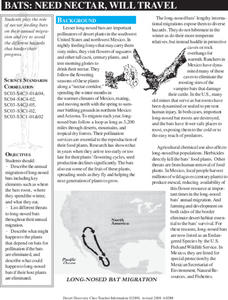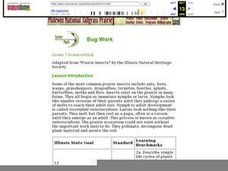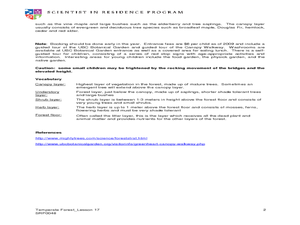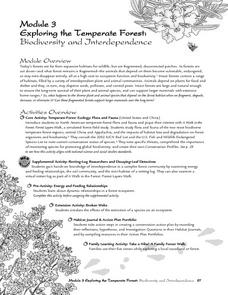Curated OER
Upper Grades Mapping Activity
Students build their school community into a better place. In this service learning instructional activity, students consider how to "cross-pollinate" the work of student organizations so that the school community experiences positive...
Curated OER
Orchids and Evolution
Students study Charles Darwin's evolutionary theory and how he applied it to orchids. In this evolution lesson students repeat Darwin's orchid pollination experiment.
Curated OER
Growing Tomatoes from Seed
In this growing tomatoes worksheet, students experience and participate in the process of growing tomatoes over a three or four month span of time. Students follow six directives in producing tomato plants.
Curated OER
Flower Structure and Reproduction
In this plant science worksheet, students color and label the different parts of the flower. They write short answers to 14 questions about flowers.
Curated OER
Observing Pods
Students observe the pistil growing into a tiny string bean-like seed pod. They then observe the development of the fertilized pods between Day 17 and Day 35 and record their observations by drawing and labeling, writing, and graphing. ...
Curated OER
Bats
Students examine the migration patterns of the long-nosed bat. They identify threats to the animal and the plants bats help pollinate. They participate in a game to help them with the information.
Curated OER
In Strawberry Fields
Students discuss the origin of strawberries and employees involved with picking strawberries. In this algebra instructional activity, students discuss how much a worker who picks strawberry makes based on their flats. They create a table...
Curated OER
Bats: Need Nectar, Will Travel
Beginning wildlife biologists become adult bats, baby bats, snakes, owls, bobcats, or land-clearing developers in a grand role-playing activity. In a large open space, they play a game in which they move to designated areas based on what...
National Wildlife Federation
Habitat Web
Young scientists weave together an understanding of ecosystems with this fun collaborative activity. Taking on the roles of different living and non-living elements of specific habitats, learners use a ball of yarn to create...
American Museum of Natural History
Bio-Benefits
Kick-start a discussion of the importance of biodiversity with a colorful resource that touts the benefits of maintaining healthy ecosystems. The images stress the interdependence of all the elements of an ecosystem.
Kentucky School for the Deaf
Levels of Organization within an Ecosystem
From tiny organisms to entire biomes, young scientists examine the interdependent relationships tying all living and non-living things together with this collection of ecology resources.
EngageNY
Posing Statistical Questions
Is this a statistical question? The opening lesson plan in a series of 22 introduces the concept of statistical questions. Class members discuss different questions and determine whether they are statistical or not, then they sort the...
Curated OER
Seed Dispersal
Pupils explore seed dispersal by designing their own wind dispersed seed structure. Using one piece of paper and a box fan, they construct a seed dispersal structure, record the distance their seed travels, and answer discussion questions.
Curated OER
Symbiosis: Help, Hinder or Destroy
Use background information and vocabulary to familiarize your students with the concept of symbiosis and the role agriculture plays in the shared relationship. They then write the vocabulary in their lab books or journals, and read the...
Curated OER
Bug Work
Young scholars explore the life cycles of insects and how they interact with each other in the prairie to create a healthy ecosystem and viable food chain. They list animals or insects in their own community that are similar to the...
Curated OER
Flower Power
Young scholars explore the parts of flowers and how they reproduce. They dissect flowers and observe the reproductive organs. Students observe anthers and ovaries of Tiger Lilies under a microscope. They investigate how insects and...
Curated OER
Honeybees are Vanishing
Students decide if they agree with a series of statements about the bee population, then read a news article about the disappearance of millions of U.S. honeybees. In this biology and current events lesson, the teacher introduces the...
Curated OER
Flower Power
Young scholars explore parts of the flower. In this plant biology lesson, students dissect flowers and identify how the seeds are formed. Young scholars take a nature walk to pick flowers for future dissections.
Curated OER
Tree Top Canopy Field Trip
Students visit the Greenheart Canopy Walkway. In this environmental lesson plan, students experience a coastal rain forest ecosystem. Students interact and explore the different layers of the rain forest.
Curated OER
Exploring the Temperate Forest: Biodiversity and Interdependence
Students examine the consequences of cutting down large amounts of forests throughout the world. In groups, they use the internet to complete a module taking them on a tour through different temperate forests. To end the lesson, they...
Curated OER
Contrasting Landscapes - UBC Farm Field Trip
Students visit the UBC Farm. In this lesson on various landscapes, students spend a day at the University of British Columbia exploring the farm and trail adjoining the campus. This lesson could be modified for use in any region that has...
Curated OER
Brays Bayou Spiderwort Genetic Study
Students formulate hypothesis based upon data gathered by examining possible crosses of spiderworts using Punnett squares. They present explanations for physiological adaptations of spiderworts that resulted from interactions within the...
Curated OER
Plant Reproduction
In this plant reproduction worksheet, students complete a crossword puzzle with 36 questions. They identify the different plant reproductive features.
Curated OER
Advanced Critical Reading: Colony Collapse
In this critical reading worksheet, students read a passage about the collapse of bee colonies and then answer questions based on the reading.



